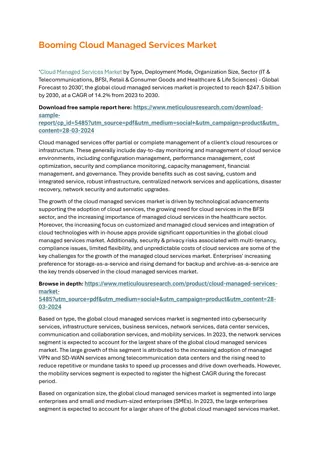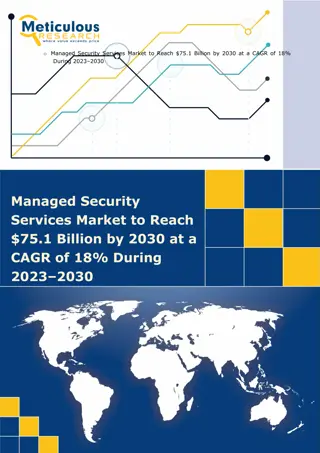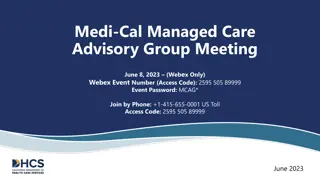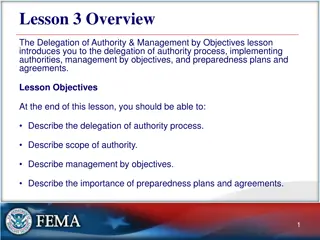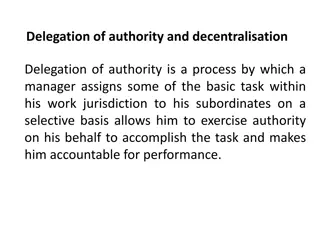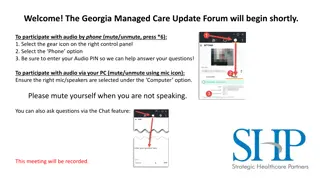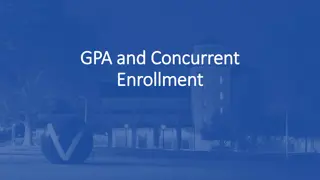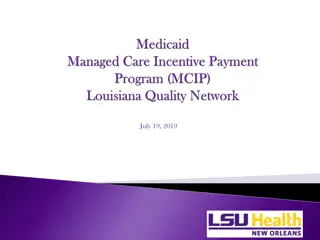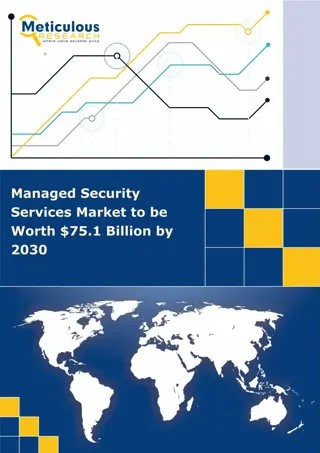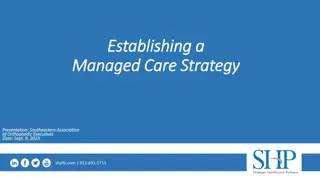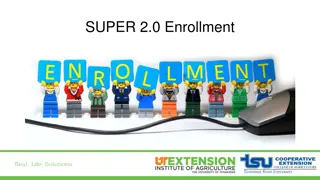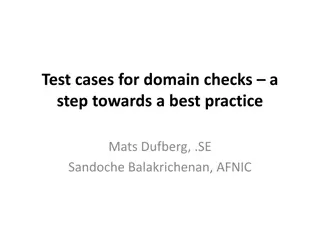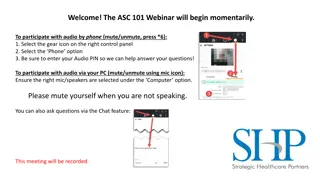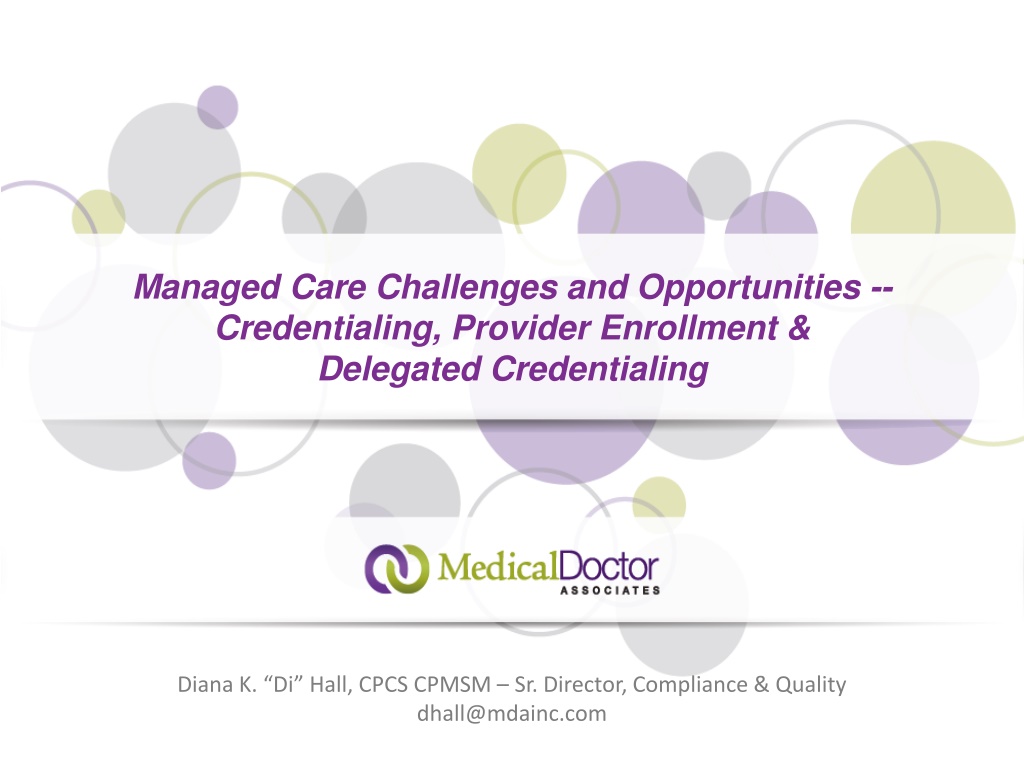
Understanding Managed Care Credentialing in Healthcare
Explore the complexities of managed care credentialing, from regulatory expectations to differences in provider enrollment responsibilities. Delve into the nuances of delegation, compliance measures, and the role of regulatory bodies in ensuring quality care. Gain insights into credentialing processes, qualifications, competencies, and the distinct roles of public and private regulatory bodies in the managed care landscape.
Download Presentation

Please find below an Image/Link to download the presentation.
The content on the website is provided AS IS for your information and personal use only. It may not be sold, licensed, or shared on other websites without obtaining consent from the author. If you encounter any issues during the download, it is possible that the publisher has removed the file from their server.
You are allowed to download the files provided on this website for personal or commercial use, subject to the condition that they are used lawfully. All files are the property of their respective owners.
The content on the website is provided AS IS for your information and personal use only. It may not be sold, licensed, or shared on other websites without obtaining consent from the author.
E N D
Presentation Transcript
Managed Care Challenges and Opportunities -- Credentialing, Provider Enrollment & Delegated Credentialing Diana K. Di Hall, CPCS CPMSM Sr. Director, Compliance & Quality dhall@mdainc.com
How are we going to roll today? Managed Care Credentialing Expectations of Regulatory Bodies Differences from traditional hospital credentialing Provider Enrollment Responsibility Making Delegation work for your facility Delegation Discussing NCQA guidelines for delegation Looking at a sample delegation contract Examining Compliance Measures 2
Who are you and where are you from? Di Hall MSP since 1993 Married to Ike, who is the Radiation Safety Officer at Emory University Hospital (Atlanta) We like penguins Dually Certified by NAMSS Have worked at MDA/CREDENT since 2006. CREDENT is certified by the National Committee for Quality Assurance (NCQA) for 10 out of 10 elements through September 2017. 3
Managed Care A system of health care in which patients agree to visit only certain doctors and hospitals, and in which the cost of treatment is monitored by a managing company.
What is Credentialing? The collection, verification and review process used to determine current professional qualifications of a provider. Does the clinical provider meet pre-established criteria for participation in a health care setting (hospital medical staff/managed care network)?
Qualifications vs. Competencies Qualifications* Education and Training Board Certification State Licensure DEA/CDS Privileges from other healthcare entities *Verifications should be from primary or approved secondary sources Competencies* Peer References Observation Procedure Logs Sanctions/Claims History *Documentation of current competence should come from the applicants peers.
Managed Care Credentialing Public Regulatory Bodies CMS Medicare Managed Care Private Regulatory Bodies NCQA: Health Plan; Managed Behavioral Health Organizations; Credentialing Verification Organization URAC: Credentials Verification Organization; Health Plan; Health Network
Accredited Managed Care Entities must follow similar guidelines for other healthcare Accreditation Organized to deliver healthcare In compliance with all local/state/federal laws Have a representative population of the entity s clinicians on the Credentials Committee Be ethical and non-discriminatory in making decisions Have secure and confidential handling of all documentation
Credentialing Basics At a minimum for Managed Care: Appropriate Licensure Appropriate DEA/CDS Certification Appropriate training/Board Certification Appropriate Malpractice Coverage Appropriate review of sanctions/claims activity Appropriate review of application packet
CVOs must follow their Clients Credentialing Guidelines URAC/NCQA have straightforward rules of what must be verified, how it must be verified and for how long that verification is valid before Credentialing Committee review. CVOs are contracted to by healthcare entities to take off the burden of qualification verification from their staff.
Provider Enrollment Contracting and credentialing oversight with healthplans by physicians, advanced practice clinicians, and healthcare entities (e.g. hospitals). - State Medicare Plans - Medicare - Insurance Companies
Other types of Provider Enrollment CAQH Account Set-up & Maintenance DEA/CDS registration Licensure application Billing IPA or Physician Groups
DELEGATION!! Who is responsible? Does this live in the MSO? Does your entity do this internally or does it delegate to others?
Delegation what is it good for? What is it? Why do it? Who allows it? How do we do it? 14
So what does NCQA say about Delegation? NCQA HP Credentialing Standards Delegation of Credentialing A written document that is mutually agreed upon and describes - responsibilities of both the delegator and the delegated entity delegated activities 15
So what does NCQA say about Delegation? NCQA HP Credentialing Standards Delegation of Credentialing process used by the delegator to evaluate the delegated entity s performance delegator s remedies if the delegated entity does not fulfill its obligations delegator must review regular (at a minimum semi-annual) delegate reports 16
So what does NCQA say about Delegation? NCQA HP Credentialing Standards Delegation of Credentialing Should also include privacy and confidentiality protections. (HIPPA Health Insurance Portability and Accountability Act of 1996) Why is HIPPA important? 17
So what does NCQA say about Delegation? NCQA HP Credentialing Standards Delegation of Credentialing PHI Protected Health Information! Allows for PHI usage by delegate (if needed!) Delegate safeguards against improper use/release (and what THEIR sub-delegates do as well) Inform delegator of any issues with PHI use/release Return, destruction, protection of PHI at end of delegation agreement 18
So what does NCQA say about Delegation? NCQA HP Credentialing Standards Delegation of Credentialing The delegator must retain the right to approve new practitioners, providers, and sites - and when necessary to terminate or suspend individual practitioners or providers based on quality issues 19
So what does NCQA say about Delegation? NCQA HP Credentialing Standards Delegation of Credentialing Evaluation of the delegated agency must occur prior to delegation and at least annually - audit of files (cred/recred) against NCQA standards - audit of processes (verification/security) against NCQA standards - Delegate performance improvement (after one year of delegation) 20
So what does NCQA say about Delegation? NCQA HP Credentialing Standards Delegation of Credentialing The delegator must review five percent or fifty of the delegated entity s credentialing files, whichever is less, as evidence if its oversight. A minimum of 10 initial credentialing and 10 recredentialing files must be reviewed. (Audit requirement is eliminated if CVO/delegated entity is NCQA certified.) 21
Delegation Agreement - Sample Elements of an Agreement Obligations Responsibilities Oversight PHI Insurance Compensation/Expenses Delivery of Information 22
Delegation Agreement - Sample Elements of an Agreement Exculpation Term of Agreement Termination Performance Evaluation Correction Action Plans Mediation/Arbitration Illegality 23
Delegation Agreement - Sample Elements of an Agreement Assignment Governing Law Certification/Compliance Authority Exhibits/Attachments Pricing Elements for verification Other Services Covered 24
Compliance Measures - Delegator What are your expectations? Format of Data Format of Delivery Timeliness of Data Delivery Verifications Copy of verification Provider profile of element/date/verifier Other 25
Compliance Measures - Delegate Reporting Outliers Measuring internal compliance Completeness Accuracy Timeliness Other 26
Auditing friend or foe? Set up a calendar Make a formal request Date/Time Number of files What is being audited Provide immediate feedback 27
Auditing Tips & Tricks Be comfortable!! Be friendly! Make expectations/needs known before date of audit. Prepare audit tools/files. Communicate, communicate, communicate! What are your tips? 28
Questions? Di Hall, CPCS CPMSM Sr. Director, Compliance & Quality Improvement Medical Doctor Associates LLC CREDENT Verification & Licensing Services LLC halld@credent.com Phone: 770-734-2186 29

